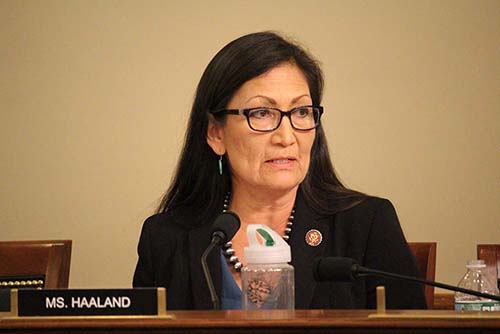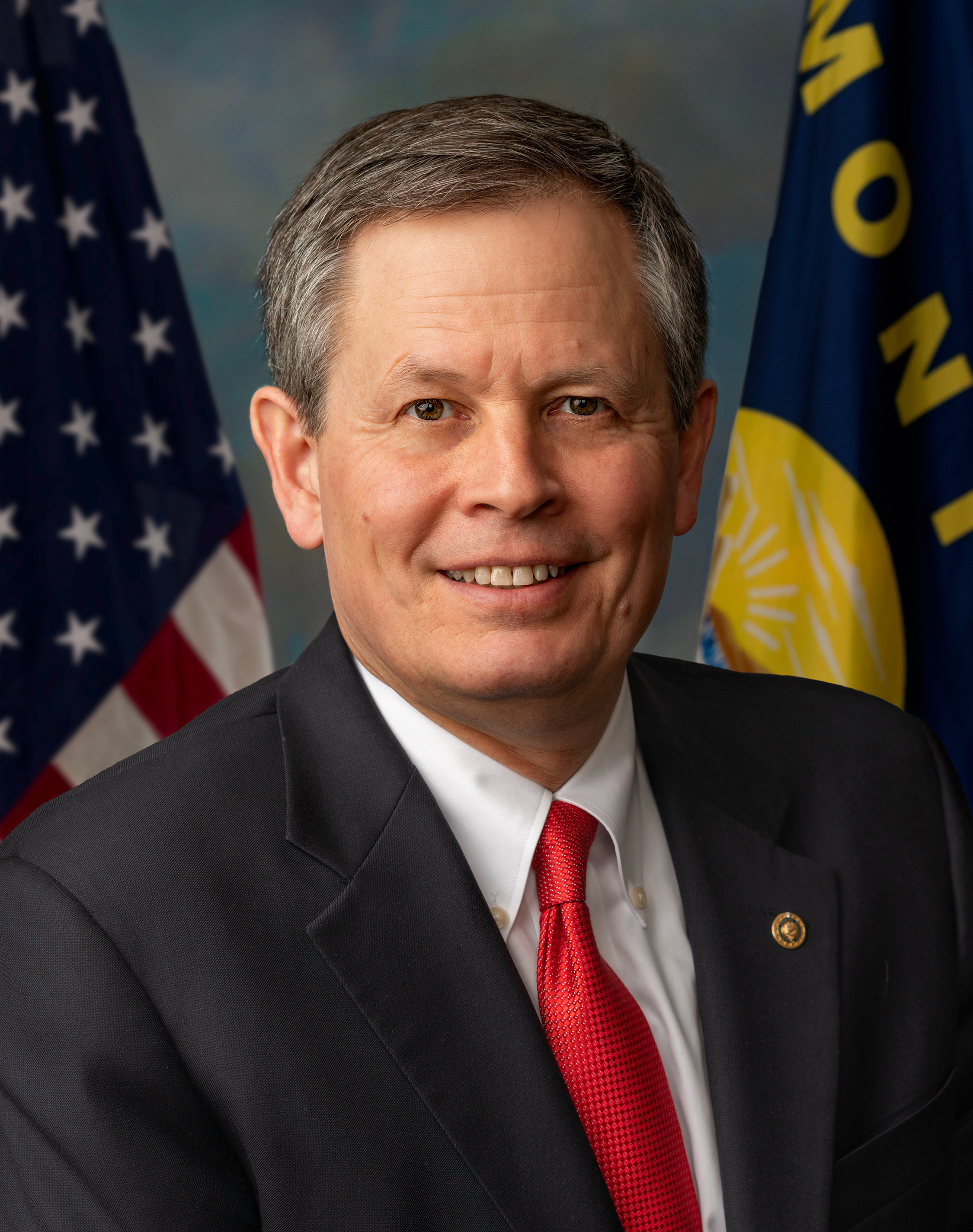
- Details
- By Levi Rickert
Opinion. Rep. Deb Haaland’s long-awaited confirmation hearing to become the 54th Secretary of the Department of the Interior is Tuesday morning.
For Indian Country, it has been a 244-year wait.
She will enter the hearing before the Senate Committee on Energy & Natural Resources as the only American Indian in history nominated by a president to serve as the secretary of a federal agency. CLICK HERE to watch the hearing on Tuesday, Feb. 23, 2021 at 9:30 a.m. - EST.
Haaland, a tribal citizen of the Laguna Pueblo, is serving her second term in Congress, representing New Mexico’s 1st Congressional District.
Deb Haaland’s tale is the stuff of an Academy Award-winning epic. She overcame homelessness as a single mother. She used food stamps and money she earned selling salsa to feed herself and her daughter. She earned her law degree in her 30s and then entered politics. She was elected to Congress in November 2018 along with Rep. Sharice Davids (Ho-Chunk), both becoming the first two American Indian women elected to Congress. And, that’s just her story. She bears the weight of the extermination of a people, the theft and pillaging of a land, and the systemic disempowerment and ostracization of Native people over centuries.
The Interior Department is home to the Bureau of Indian Affairs, Bureau of Indian Education, Office of Special Trustee, and Bureau of Land Management. The department manages 500 million acres of public land – about 20 percent of the land in the United States. As vice-chair of the Natural Resources Committee and the chair of the Subcommittee on National Parks, Forests, and Public Lands, Haaland shepherded key bipartisan legislation through the U.S. House, including the historic Public Lands package in 2019 and the Great American Outdoors Act in 2020. The two pieces of legislation redirect revenues from offshore oil and gas drilling into conservation, helping to create trails, parks, and recreation destinations in all 50 states. They also use revenues from energy development to provide maintenance for critical facilities and infrastructure in national parks, forests, wildlife refuges, recreation areas, and American Indian schools.
Who better than Haaland, a member of Indian Country, to run these bureaus? Who knows more about Indian Affairs, Indian Education and Land Management and the impact that centuries of legislation have had on Native people?
Some among us don’t want Haaland running such an office. Last month, a group of Republican members of the House of Representatives asked Biden to withdraw Haaland’s name from consideration, even though they have no say (the Senate does) in her confirmation.
Earlier this month, Sen. Steve Daines (R-MT), whose campaign received $632,551 since 2016 from oil and gas industry funds, called Haaland a radical, saying he would block her nomination.
“I'm deeply concerned with the Congresswoman's support on several radical issues that will hurt Montana, our way of life, our jobs and rural America, including her support for the Green New Deal and President Biden's oil and gas moratorium, as well as her opposition to the Keystone XL pipeline,” Daines said after meeting with Haaland.
The reason she is opposed so vociferously by members of the Republican Party has nothing to do with her support of the Green New Deal. The Green New Deal is not radical. It is supported by hundreds of lawmakers, world leaders and organizations.
The president naming a Native American to a cabinet post such as Interior is not radical – it’s progress. That instead of tossing another obstacle Haaland’s way, he is handing her the remote. And this Republican group, funded in their posts by oil and gas, can’t bear the thought of centuries of wrongs to be acknowledged, reversed or repaired.
Daines’s threat to block Haaland drew the ire of Indigenous tribal organizations. They have paid for billboards and newspaper advertisements in Montana to push back.
“With his condescending and cynical remarks, Senator Daines may succeed in ginning up the MAGA base, but he also evokes the ‘Great White Father’ in his paternalistic attitude toward not only Representative Haaland but his Indigenous constituents. His buzzword of choice to undermine her is ‘radical’ and so we’ve given it right back to him,” said Rain Bear Stands Last, executive director of the Global Indigenous Council, in reference to pro-Haaland print and digital ads that began appearing in Montana this week as well as other states.
“The only radical thing about one of the First People of the Land being nominated to care for it, is that it took over 244 years to happen,” reads one advertisement.
The anger by tribal organizations is long overdue. This is just one more example of elected officials ignoring the desires of tribal citizens within their congressional districts and states.
“Even though he’s a senator from the state of Montana, his statements did not reflect the views of the tribes,” Holly Cook Macarro, chairwoman of the American Indian Graduate Center, said of Daines in The Washington Post. Native people are nearly 10 percent of Montana’s population, she added. “We are not invisible.”
Incredulously, Daines sits on the Senate Committee on Indian Affairs. It would stand to reason a U.S. senator who cannot support the first American Indian who is highly qualified to serve in a presidential cabinet does not deserve to sit on the Senate Committee on Indian Affairs.

Sen. Daines being a member of the Sentate Committee on Indian Affairs is suspect at this point. Why is he there if he cannot support American Indians or their positions on issues? By virtue of its name, the committee's members should be dedicated to promote American Indian affairs. We do know Daines is highly partisan, who when he was a member of the House of Representatives voted against the reauthorization of the Violence Against Women Act that contained a tribal provision. Since being in the Senate, Daines has a record that is suspect in regards to Indian concerns.
Haaland will likely have enough votes to be confirmed. However, it is unfortunate those members of Congress who receive oil and gas money have voiced so much opposition to her nomination.
Indian Country needs to keep score. Unfortunately, Daines was reelected in 2020; so the Montana tribes have to put up with him for six long years. However, midterm elections are 21 months away and others who oppose Haaland's confirmation should be targeted by tribes and voted out of office.
More Stories Like This
Tribal Economic Development Programs in the Federal Contracting Environment: What They Are, and What They Are NotWhy Redefining Public Health Degrees Would Harm Native and Rural Communities
The SAVE America Act Threatens Native Voting Rights — We Must Fight Back
The Presidential Election of 1789
Cherokee Nation: Telling the Full Story During Black History Month
Help us defend tribal sovereignty.
At Native News Online, our mission is rooted in telling the stories that strengthen sovereignty and uplift Indigenous voices — not just at year’s end, but every single day.
Because of your generosity last year, we were able to keep our reporters on the ground in tribal communities, at national gatherings and in the halls of Congress — covering the issues that matter most to Indian Country: sovereignty, culture, education, health and economic opportunity.
That support sustained us through a tough year in 2025. Now, as we look to the year ahead, we need your help right now to ensure warrior journalism remains strong — reporting that defends tribal sovereignty, amplifies Native truth, and holds power accountable.
 The stakes couldn't be higher. Your support keeps Native voices heard, Native stories told and Native sovereignty defended.
The stakes couldn't be higher. Your support keeps Native voices heard, Native stories told and Native sovereignty defended.
Stand with Warrior Journalism today.
Levi Rickert (Potawatomi), Editor & Publisher

